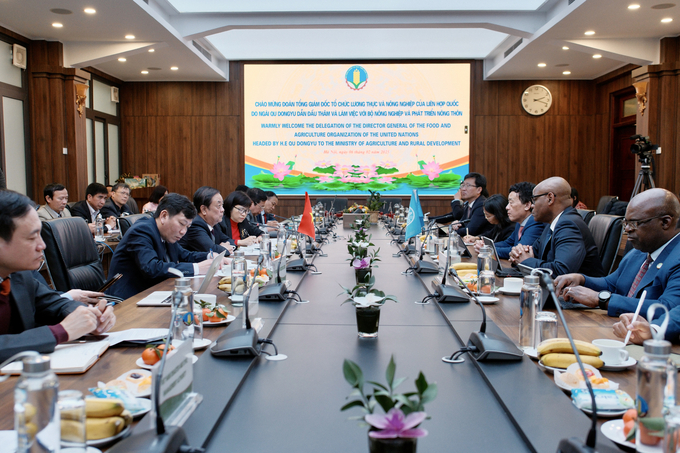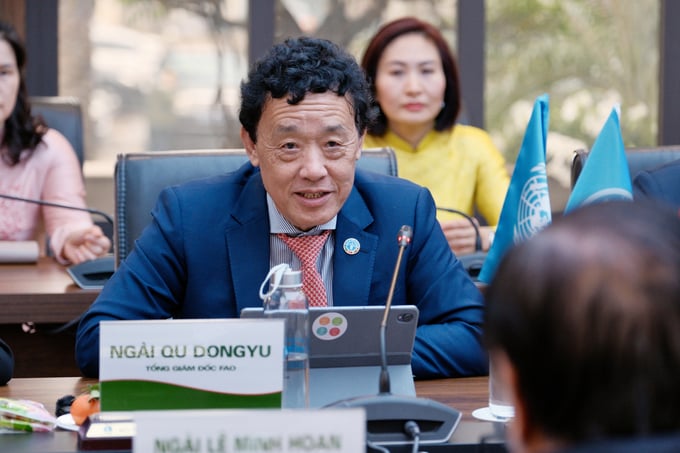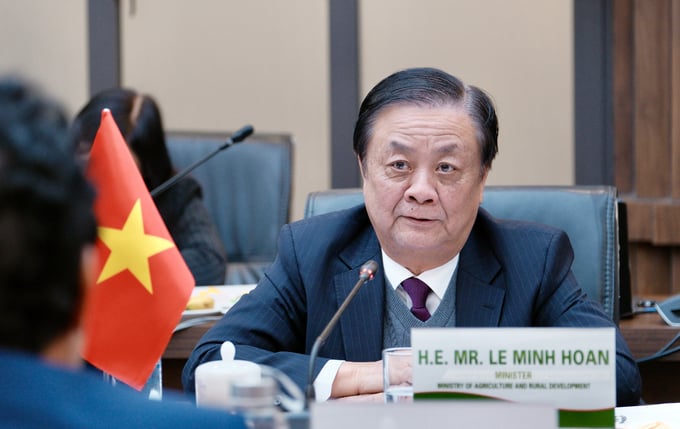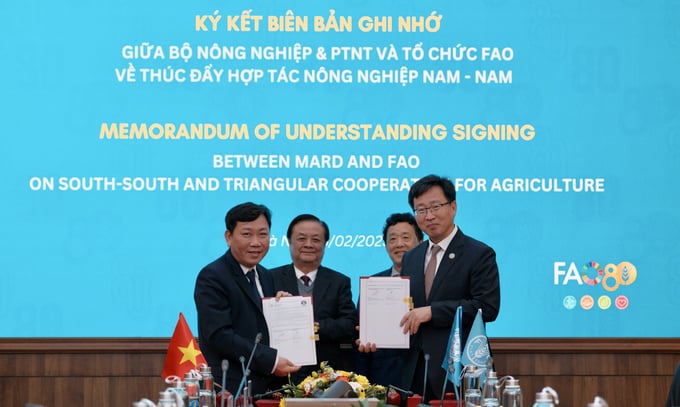June 16, 2025 | 03:20 GMT +7
June 16, 2025 | 03:20 GMT +7
Hotline: 0913.378.918
June 16, 2025 | 03:20 GMT +7
Hotline: 0913.378.918

Meeting between Minister of Agriculture and Rural Development Le Minh Hoan and senior leaders of the Food and Agriculture Organization of the United Nations (FAO) on February 6. Photo: Quynh Chi.
On February 6, Minister Le Minh Hoan met with a high-level delegation from the Food and Agriculture Organization of the United Nations (FAO), marking the first official international visit to the Ministry of Agriculture and Rural Development (MARD) in the Year of the Snake.
On behalf of Vietnamese farmers, Minister Le Minh Hoan expressed gratitude for FAO’s support through more than 400 projects aimed at promoting sustainable development in agriculture, forestry, and fisheries. He acknowledged FAO’s contributions in providing technical and financial assistance, as well as training programs that have helped stabilize livelihoods post-war and drive socio-economic growth.
In response, Director-General Qu Dongyu praised Vietnam’s active engagement in FAO-led initiatives, not only within the region but also on a global scale. He emphasized that a shift in mindset is the key driver of transformative change in Vietnam’s agricultural sector.
“An innovative mindset and global integration are the strengths of the MARD. Moving forward, efforts should focus on synchronizing value chains and gradually developing a green agrifood economy, thereby enhancing Vietnam’s position on the global agricultural map,” he stated.
Sharing international insights, he noted that successful agricultural economies often begin with local products, such as those under the One Commune One Product (OCOP) program, which adds value to agricultural goods. This is followed by broader initiatives to build “green cities” in rural areas – crucial milestones that contribute to social security and rural development.

FAO Director-General highly appreciated Vietnam's strong transformation. Photo: Quynh Chi.
Vietnam is restructuring its agricultural sector to enhance added value and ensure sustainable development, adapting to global trends such as trade liberalization, climate change, and food loss prevention. As part of World Food Day 2024, 45 domestic and international partners signed the Partnership Agreement on Food System Transformation in Vietnam, reaffirming their commitment to sustainable agriculture.
In addition, the “One million hectares of high-quality, low-emission rice in the Mekong Delta” project is establishing a specialized rice-growing region that meets high standards, enhances farmers’ incomes, and reduces greenhouse gas emissions.
FAO Director-General Qu Dongyu highly commended this initiative and suggested that, following the initial success of the rice sector's green transformation, Vietnam could expand this model to other industries, including agriculture, forestry, and fisheries.
He noted, “We are also closely monitoring Vietnam’s institutional changes and hope that the merger of the Ministries of Agriculture and Environment will create a strong foundation for this transition. In today’s economic landscape, environmental sustainability and food security are closely interconnected and mutually reinforcing.”

Minister Le Minh Hoan shares the Vietnamese Government's green initiatives to improve farmers' income. Photo: Quynh Chi.
Over the past two decades, Vietnam has actively engaged in the South-South Cooperation initiatives. According to the FAO Director-General, now is the time for Vietnam to expand its influence and establish itself as a key player in global food security, alongside China, Japan, South Korea, Russia, and India.
Minister Le Minh Hoan shared that in the past year, Vietnam welcomed more African ministers and ambassadors than ever before. With FAO’s support in mobilizing resources, he expressed hope that this collaboration would continue to strengthen.
“However, current projects remain small in scale, primarily focused on technical support in areas such as rice breeding, cultivation, and irrigation. Moving forward, we aim to expand international cooperation beyond individual projects, leveraging South-South and tripartite partnerships,” the Minister stated.
He also highlighted the crucial role of Vietnamese experts – those with deep knowledge of Africa’s culture, economy, and on-the-ground challenges. This expert network, he emphasized, is essential for ensuring effective and sustainable South-South cooperation.

The MARD and FAO signed a Memorandum of Understanding to promote common goals in the South-South cooperation and tripartite cooperation mechanisms. Photo: Quynh Chi.
Director-General Qu Dongyu expressed FAO’s commitment to supporting Vietnam’s deeper involvement in South-South Cooperation, affirming, “FAO stands ready to assist Vietnam in expanding its role, as this will not only benefit Vietnam but also contribute to the development of countries across the Global South.”
On this occasion, the Ministry of Agriculture and Rural Development and FAO signed a Memorandum of Understanding to establish a framework for cooperation, promoting common goals in the South-South Cooperation and Tripartite Cooperation mechanisms.
Main priority areas of cooperation between FAO and the Ministry of Agriculture and Rural Development includes technical assistance in agriculture, food security and nutrition, resource management technology, One Health, food safety, agroecology and climate action.
Translated by Quynh Chi

(VAN) The working delegation from the Ministry of Agriculture and Environment conducted an important trip to the Netherlands to strengthen strategic partnerships and sustainable development in the agricultural sector.

(VAN) The letter ‘A Plea from the Ocean’ not only evokes emotion but also awakens the human conscience to the responsibility of protecting life on Earth.

(VAN) The Department of Agriculture in South Africa has announced the country’s first mass vaccination of poultry to prevent local birds from contracting avian influenza.

(VAN) Establishment of the Mekong Delta Regional Agricultural Linkage Center, aiming for a closed value chain, deep processing, trading platforms, and international market connectivity.

(VAN) Gia Lai province has recently recorded 460 rare species of animals and plants, contributing to forest conservation and biodiversity planning in the region.

(VAN) Ms. Caroline Beresford, New Zealand Ambassador to Vietnam, expressed confidence that agricultural cooperation between Vietnam and New Zealand will develop sustainably, be climate-resilient, and promote gender equality.

(VAN) Vietnam reaffirms its commitment to international cooperation in fostering sustainable and responsible fisheries while ensuring resilient livelihoods for small-scale fishing communities.